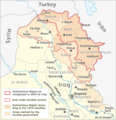پێڕستی میرنشین و وڵاتە کوردییەکان
ڕواڵەت
(لە پێرستی میرنشین و وڵاتە کوردییەکانەوە ڕەوانە کراوە)


ئەمە پێڕستی خانەدان، میرنشین و وڵاتە کوردییەکانە.
میرنشینە پێشووەکان
[دەستکاری]- ھەزەبانی (٩٠٥، ورمێ و ھەولێر)
- شوانکارە (١٠٢٠–١٢٠٠، چیاکانی زاگرۆس)
- شەدادی (٩٥١–١١٩٩ یان ١٢٠٠، باشووری قەوقاز)[١]
- ڕەوەندی (٩٥٥–١٠٧١،[٢] تەورێز و مەراغە[٣])
- ھەزەبانی (٩٤٣–١٠٦٣، ورمێ و ھەولێر)
- مەروانی (٩٨٣–١٠٩٦، ئامەد)[١]
- کاکەوەیھی (١٠٠٨–١١٤١، ئەسفەھان و یەزد)
- میرنشینی گێل (١٠٤٩، گێل)
- شکاک (١١٨٠، باکووری پارێزگای ورمێ)
- حەسنەوییەکان (٩٥٩–١٠٩٥، کرماشان)[١]
- سوارچاکانی جەفایی (١١١٤، نێوان ڕۆژھەڵات و باشووری کوردستان)
- عەنازی (٩٩١–١١١٧، کرماشان)[١]
- دەوڵەتی ئەییووبی (١١٧١–١٣٤١، یەمەن، حیجاز، لیبیا، میسر و شام)
- میرنشینی بنگۆل (١٢٣١–١٨٦٤، چەولیگ، باکووری کوردستان)
- میرنشینی حەسکیف (١٢٣٢–١٥٢٤، حەسکیف)
- میرنشینی کلس (١٢٦٤–؟، کلیس و حەلەب)
- گەرمیانییەکان (١٣٠٠–١٤٢٩، ڕۆژاوای ئەنادۆڵ، کوتاھیا)
- میرنشینی مەلکیشی (١٣١٠–١٦٦٣، چەمشگەزەک)
- میرنشینی زیرقان (١٣٣٥، باکووری مێردین)
- زەکەریاکان (١١٦١–١٣٦٠، ناوچەکانی وڵاتی جۆرجیا)
- ھەزارئەسپ (١١١٥–١٤٢٤، زنجیرەچیاکانی زاگرۆس)
- قۆچگری (١٣٦٠–١٣٧٠، ناوەڕاست و ڕۆژاوای باکووری کوردستان)
- میلان (١٣٨٠، نزیک ئازەربایجانی ڕۆژاوا)
- میرنشینی مەحموودی (١٤٠٦–١٨٣٩، وان و ھەکاری)
- میرنشینی پازۆکی (١٤٩٩، دەوروبەری خنووس، ئەرچیش، بازید و نەخچیڤان)
- میرنشینی برادۆست (١٥١٠، ڕەواندز)
- میرنشینی پنیانشی (١٥٤٨، سەڵماس و سۆمای)
- ویلایەتی شارەزوور (١٥٥٤–١٨٦٢، شارەزوور)
- میرنشینی سلێمان (١٥٦٠–١٨٣٨، پاسوور و سلیوانا)
- میرنشینی ئەردەڵان (١١٦٩–١٨٦٧)
- میرنشینی بابان[٤] (١٦٤٩–١٨٥١،[٥] ھەرێمی سلێمانی[٦])
- میرنشینی سۆران[٤] (کۆتایی سەدەی ١٤–١٨٣٥[ژێدەر پێویستە]، ڕەواندز[٦])
- میرنشینی حەکاری[٤] (١٣٨٠–١٨٤٥، ئێستا باشووری ڕۆژھەڵاتی تورکیا[٦])
- میرنشینی بادینان[٤] (١٣٣٩–١٨٤٣، ئامێدی[٦])
- میرنشینی بۆتان[٤] (١٣٣٠–١٨٥٥، جزیر[٦])
- میرنشینی موکریان (کۆتایی دەیەی ١٤٠٠ ھەتا ناوەڕاستی دەیەی ١٨٠٠)
- زەندییەکان[٧] (١٧٥٠–١٧٩٤)
- خانەدانی تەورێز (١٧٥٧–١٧٩٩، دەوروبەریی تەورێز)
- میرنشینی شرڤان (١٢٩٠–١٥٠٨ دواتر ١٨٤٠–؟، شرڤان، باکووری کوردستان)
- ئەیالەتی کوردستان (١٨٤٦–١٨٦٧، ئامەد و بەشێک لە ناوچەکانی باکووری کوردستان)
- سانەکانی ھەورامان
وڵاتە پێشووەکان
[دەستکاری]- دەوڵەتی کوردی (١٩١٨–١٩١٩)
- شانشینی کوردستان (١٩٢١–١٩٢٤ و ١٩٢٥)
- کوردستانی سوور (١٩٢٣–١٩٢٩)
- ئۆکروگی کوردستان (١٩٣٠)
- کۆماری ئارارات (١٩٢٧–١٩٣٠)
- کۆماری کوردستان (١٩٤٦–١٩٤٧)
- کۆماری کوردیی لاچین (١٩٩٢)
- میرنشینی ئیسلامیی بیارە (٢٠٠١–٢٠٠٣)
ھەنووکە
[دەستکاری]- ھەرێمی کوردستان (١١ی ئازاری ١٩٧٠–)
- حکوومەتی ھەرێمی کوردستان (٤ی تەمموزی ١٩٩٢–)
- خۆبەڕێوەبەریی باکوور و ڕۆژھەڵاتی سووریا یان خۆبەڕێوەبەریی ڕۆژاوا (٢٠١٣–)
ئەمانەش ببینە
[دەستکاری]پەراوێز
[دەستکاری]- ^ ئ ا ب پ Amir Hassanpour, Nationalism and Language in Kurdistan, 1918-1985, Mellen Research University Press, 1992, p. 50.
- ^ Misbah Islam, Decline of Muslim States and Societies, Xlibris Corporation, 2008, ISBN 978-1-4363-1012-3, p. 423.
- ^ Jamie Stokes, Encyclopedia of the Peoples of Africa and the Middle East, Volume 1, Infobase Publishing, 2009, ISBN 978-0-8160-7158-6, p. 382.
- ^ ئ ا ب پ ت Gérard Chaliand, A People Without a Country: The Kurds and Kurdistan, Zed Books, 1993, pp. 17-18.
- ^ BĀBĀN, Kurdish princely family in Solaymānīya, Iranica
- ^ ئ ا ب پ ت Hirmis Aboona, Assyrians, Kurds, and Ottomans: Intercommunal Relations on the Periphery of the Ottoman Empire, Cambria Press, 2008, ISBN 978-1-60497-583-3, p. 160.
- ^ A fourth pretender was Karim Khan, son of Aymak of the Zand, a section of Lak tribe, Sir Percy Molesworth Sykes, A History of Persi, Macmillan and co., limited, 1930, p. 277.
بەستەرە دەرەکییەکان
[دەستکاری]-
کوردستانی سەربەخۆ بە پێی پەیمانی سیڤەر (لە ١٩٢٠)
-
کوردستانی سوور (١٩٢٣–١٩٢٩)
-
ھەرێمی کوردستان



